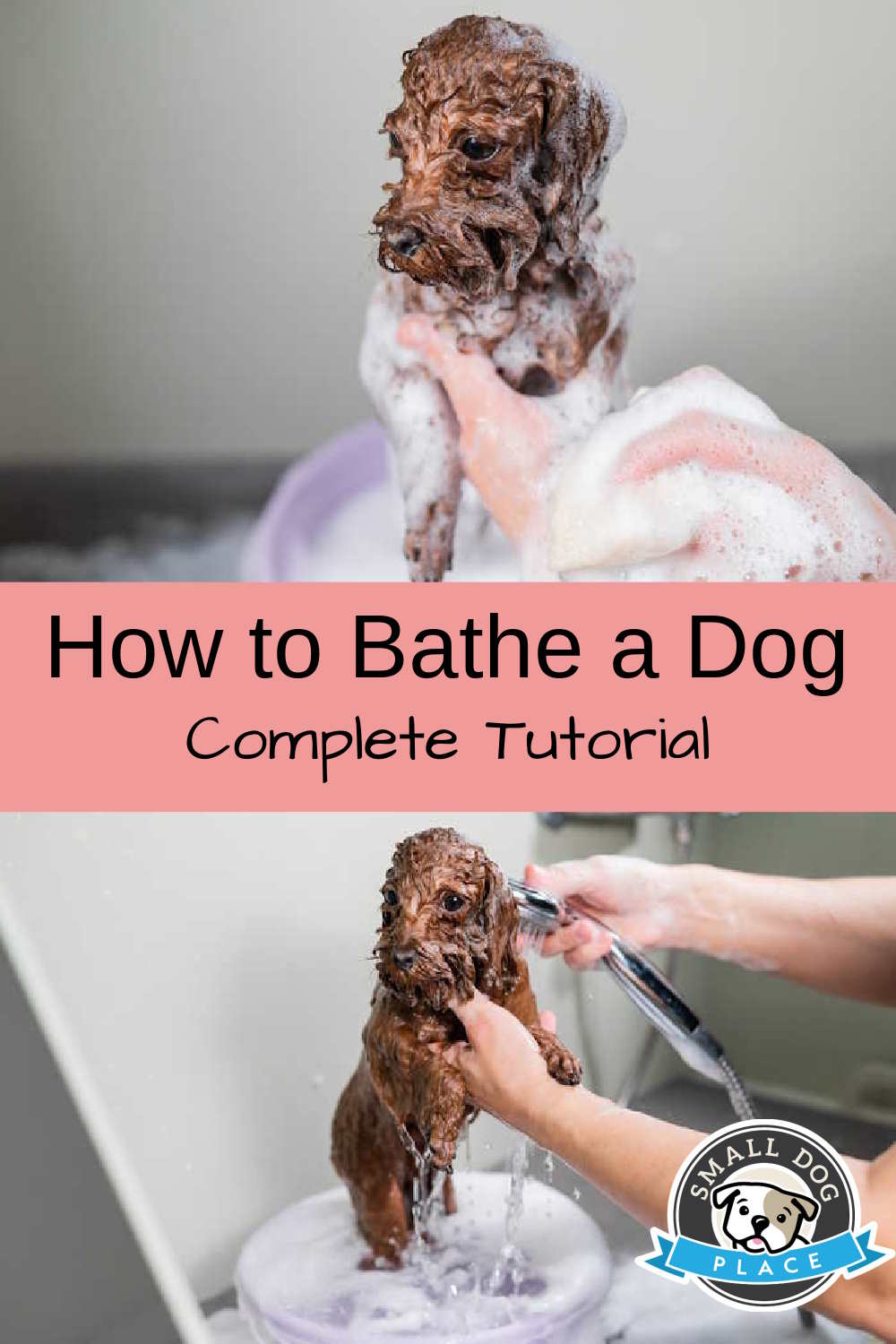- Small Dog Place Home
- Grooming
- How to Bathe a Dog
How to Bathe a Dog
By Janice A. Jones | Updated 02-09-2024
If you are wondering how to bathe a dog, relax. You are not alone. Many wonder if there is an easy way to give their small dog a quick but thorough bath.
Here is a bathing method that should take less than 10 minutes, leaving your dog smelling fresh and clean.
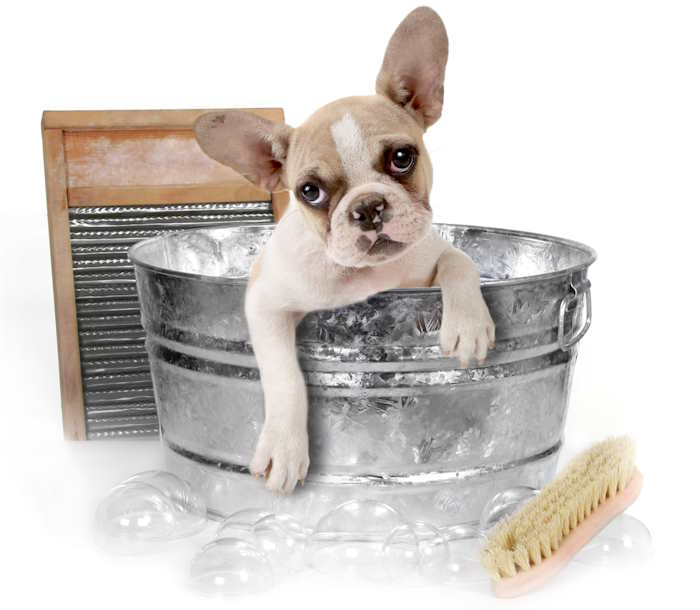
How to Bathe a Dog
The excellent news about bathing a small dog is that he is
small and manageable. You can control the situation even if he decides to
squirm about or shake all the water off him and onto you.
Puppies can be trained to enjoy grooming and especially the bath. Therefore, as I tell you how to bathe a dog, I will also describe how to train your dog so you will end up with a dog you feel confident washing.
Bathing a Puppy Video

How Often Should You Bathe Your Dog?
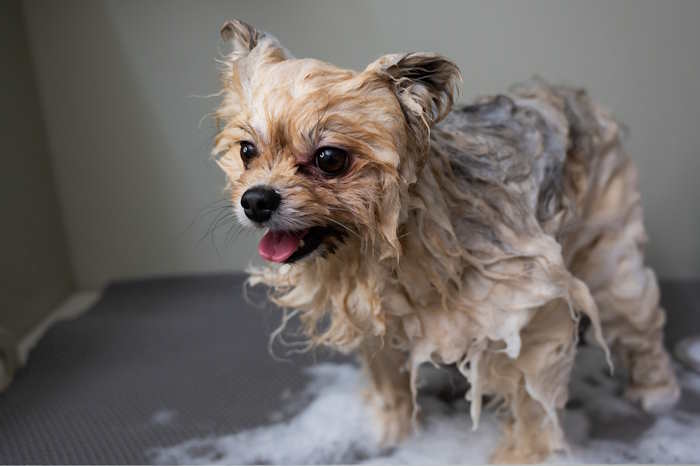 How often you bathe your dog depends on a number of factors.
How often you bathe your dog depends on a number of factors.There are no hard and fast rules specific rules dictating
the number of days between bathes. Instead, the frequency of dog baths depends
on numerous factors, including the breed, lifestyle, and dog's health.
Some dogs might need a bath as frequently as once a week, while others may only require a bath once every few months.
Generally, dogs should be bathed at least once a month to keep them clean and prevent odors. Dogs who spend more time outdoors, have longer hair or have skin conditions may need baths more often.
However, the American Kennel Club's experts warn that too frequent bathing can strip the coat of natural oils, leading to dry skin and irritation (Source: American Kennel Club, "How Often Should You Wash Your Dog," 2019).
They recommend adjusting the frequency according to the dog's breed, lifestyle, and specific skin conditions and always using a dog-approved shampoo. Always consult a veterinarian for specific advice on your dog's skin and coat health.
There are always exceptions to the rules. Dogs with specific skin conditions may benefit from more frequent bathing.
A study published in the British Journal of Dermatology found that bathing dogs with mild to moderate atopic dermatitis with a specially formulated shampoo significantly improved the condition of their skin (Source: Chavanne TJ, et al. "Influence of a topically applied coal tar-containing shampoo (Dermadual®) versus a neutrophil shampoo on clinical signs and skin barrier function in dogs with spontaneous atopic dermatitis." British Journal of Dermatology, 2015).
How to Bathe a Dog: Supplies You will Need
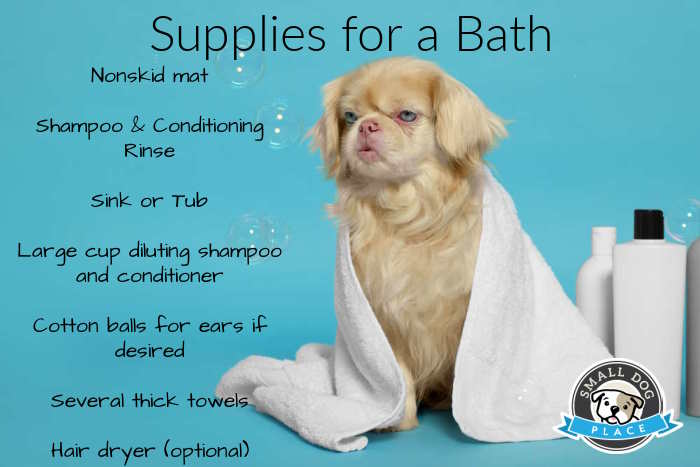 Supplies for a Dog Bath
Supplies for a Dog Bath- Nonskid mat for the sink (a rubber mat intended for a bathtub or shower works well if trimmed)
- Shampoo & Conditioning Rinse
- Sink with a spray nozzle if possible; if not, you will need to reposition your dog periodically to get him thoroughly washed and rinsed.
- Large cup or plastic bottle for diluting shampoo and conditioner
- Cotton balls for ears if desired
- Several thick towels
- Hair dryer
- A gentle voice and a few treats
How to Bathe A Dog: Preliminary Steps
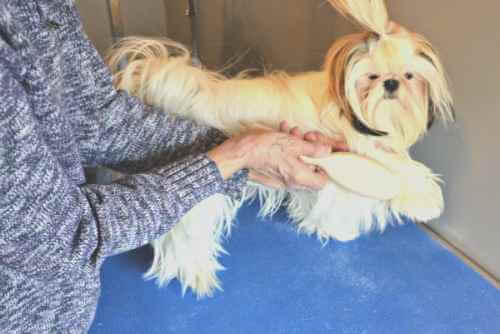 Prior to bathing, brush out any tangles in a long-haired dog
Prior to bathing, brush out any tangles in a long-haired dogBefore bathing your small dog, brush the coat thoroughly,
ensuring you remove any tangles from the coat.
Knots tend to get worse when they get wet. You can skip this step if your small dog has a short coat. Beyond that, bathing a small dog is like washing a human infant. If you make it an enjoyable experience, your fur baby will love all the attention and pampering.
Always keep a hand on your dog, even if they have never tried to jump out of the sink. When the dog relaxes and remains still, praise him. A massage behind the ears also helps a skittish dog to relax.
How to Bathe a Dog: The Bath
 A good bath involves thorough soaping, but do be careful not to get shampoo in your dog's eyes.
A good bath involves thorough soaping, but do be careful not to get shampoo in your dog's eyes.I like to use the kitchen sink. However, you can also
use your bathtub, an infant bathtub, or a large plastic container.
Place the small towel or skid-free mat on the sink's base so your puppy or dog will not slide around.
Add a little warm water and lift your dog gently into the sink. You do not need a lot of water, or your small dog may become fearful. An inch of water is fine.
First, get him thoroughly soaked using a spray or cup to pour water over his entire body.
Use good quality dog shampoo. I like to use hypoallergenic dog shampoo.
You might want to use a puppy shampoo if your dog is under a year old. There are shampoos specifically for dogs that shed. Do not use your own shampoo, as human products tend to dry out your small dog's coat.
A whitening shampoo works well if your dog is white or has a primarily white coat. An excellent soothing shampoo will contain oatmeal. If your dog is scratching, you might consider an oatmeal-based shampoo.
Instead of placing the shampoo directly on the dog, I like to put some in a cup and add warm water. I mix it thoroughly and then pour it onto the coat, ensuring I do not get it in their eyes.
An alternative method that works well is to purchase a plastic bottle from a local beauty supply store and dilute the shampoo in it. An excellent soothing shampoo will contain oatmeal. Always follow the label instructions for cutting.
I work it into a lather, especially on their pads, as their feet tend to get dirtier than the rest. Since most dogs do not like their faces washed, I leave that part until the end.
If you are careful, you can put shampoo on their head, the hair around their muzzle, and the ears and chest if you cover their eyes with one of your hands.
You can use a washcloth if you prefer, but since the face area gets very dirty, keeping the shampoo on for a few minutes before rinsing is a good idea.
How to Bathe a Dog: The Rinse
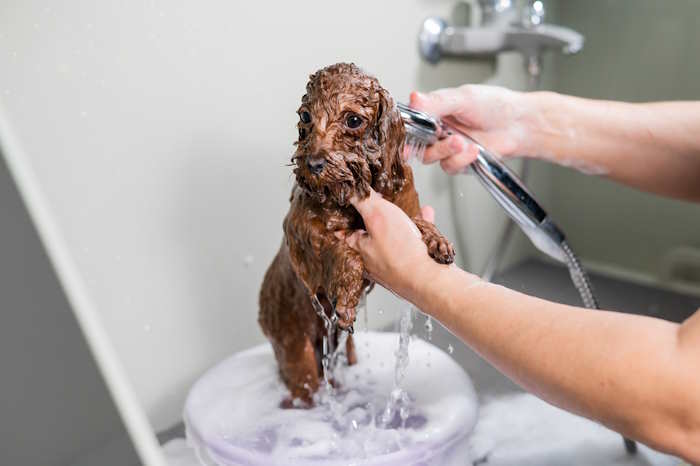 A hand-held nozzle makes giving a dog a bathe much easier.
A hand-held nozzle makes giving a dog a bathe much easier.Rinse with warm water. You should express his anal glands while in the tub. Next, I use a conditioning rinse, but once again, I mix it in a cup or plastic bottle filled with warm water.
I then pour it over the coat and massage it in. I like to keep it on for a minute or two or longer if the dog will allow it. If I am massaging, he usually does not protest at all. I will then rinse it out.
Some people like to keep a trace of the conditioner on the coat. This helps with brushing, but do not leave so much on that the hair becomes oily. Have a towel handy and ready to go because the first thing your small dog will do is shake off the water.
How to Bathe a Dog: The Blow Dry
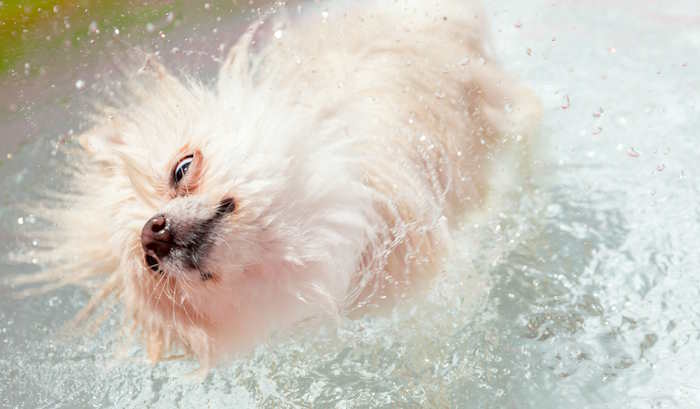 To prevent getting a shower yourself, have a towel open and ready to wrap around your dog.
To prevent getting a shower yourself, have a towel open and ready to wrap around your dog.If you wrap him up in a towel quickly, he cannot spray water on you. Pat gently dry, but do not rub a long-haired dog's coat, which will tangle the hair. Keep him wrapped in a towel while you blow him dry with a hair dryer.
If you have a short-haired dog and the temperature inside the home is warm, the dog should dry quickly without a hair dryer. But remember, the more time you spend drying with a towel, the shorter the time you spend with the blow dryer. Most dogs would prefer a towel to a blow dryer any day.
You can purchase a dryer specifically for pets or use your own. Use the low or cool setting of your blow dryer. I like to hold the dryer with one hand and brush with the other, but that is only because my dogs have become accustomed to laying still.
If you are doing this on a table, I recommend always keeping one hand on the dog if they are not tethered. It is also helpful if someone holds the dryer for you, giving you an extra free hand.
Many pet dryers come with a stand, which is extremely useful, allowing your hands to be accessible for brushing.
If your dryer does not have a stand and you still want a free hand for brushing, prop the dryer on a folded-up towel. If you do this, check frequently and never block the air intake duct.
Bathing can become an enjoyable experience for you and your dog and provides an opportunity to bond with your dog. Keep it positive, and have some extra treats if your little one resists. Consider giving your dog a chew to occupy her while you use the blow dryer.
Managing Nervous, Aggressive, and Fearful Dogs During Bath-Time
It happens; our fur babies freak out when the water is turned on. Please don’t take it personally, as there may be reasons this happens beyond your control. If this does happen, it makes sense to determine what might be causing their distress. Sometimes, the answer is simple:
- The water is too hot.
- The water is too cold.
- The water is too deep, or the spray is too forceful.
- The base of the sink or tub is slippery.
These are easy fixes. When dealing with a dog that hates baths, the solution often requires a bit more creativity.
Handling dogs that are nervous, uncomfortable, or who become aggressive and overly fearful during bath time can be a sensitive task, but it's not impossible to manage.
For anxious dogs, provide a calm environment; try running the bath water before bringing them in to avoid the scary sound of rushing water. Utilize positive reinforcement through treats, compliments, or their favorite toy to reward their bravery. Speak in a soft, calm voice and keep one hand firmly on the dog.
For dogs showing signs of aggression, consider involving a professional groomer or a behaviorist who can handle such situations safely and effectively. It may also be possible to counter-condition your dog by associatively pairing the fearful situation (bath time) with something pleasant (like treats).
Some small dog breeds can wear a muzzle to help protect you, but that is not always possible if you have a brachycephalic breed.
Consult your vet or professional dog trainer for the best approach for your situation. Remember, forcing an extremely fearful dog through bath time can lead to greater fear and even potential bites - safety should always be your primary concern.
If all else fails, consider a professional groomer. Most owners think groomers only clip long-haired dogs, but shorthaired dog breeds need bathes and nail clips regularly. An experienced groomer may be the perfect solution.
What Should You Do If Soap Gets in Your Dog’s Eyes
If soap gets into a dog's eyes during a bath, it's essential to act swiftly to minimize discomfort or potential damage. The first step is to rinse your dog's eyes immediately using a steady stream of water.
Saline solution or dog-friendly eye wash can be gently poured or squirted into the eyes to help clean them out. Hold their eyelids open to ensure the soap is completely flushed out.
Avoid rubbing the eyes, as it could cause further irritation. If your dog continues to show signs of discomfort, such as squinting, redness, swelling, or excessive tear production, after rinsing the eyes, you should contact your vet as soon as possible for further guidance.
Be careful when applying shampoo in the future, and consider using a tearless puppy shampoo, especially if you have a squirmy dog or a bathing tool like a shower cap for dogs to avoid soap getting in the eyes.
How to Give a Dog a Bath: HINTS
- Use good quality products.
- Use a firm but gentle approach.
- Talk in a soft, soothing voice.
- Use a thick towel and remove as much moisture from the hair as possible before blow-drying.
- Train a puppy to love and bathe with lots of TLC, praise, and a few treats.
- Use a cool setting on the dryer to avoid burning the dog, or let your dog dry naturally in a warm location.
How to Bathe a Dog: Pin for Future Reference
About Janice (author and voice behind this site)
Having lived with dogs and cats most of her life, Janice served as a veterinary technician for ten years in Maryland and twelve years as a Shih Tzu dog breeder in Ohio.
Her education includes undergraduate degrees in Psychology with a minor in biology, Early Childhood Education, and Nursing, and a master's in Mental Health Counseling.
She is a lifelong learner, a dog lover, and passionate about the welfare of animals. Her favorite breed for over 50 years has been the Shih Tzu, but she has also lived with Poodles, Maltese, Yorkshire Terriers, Beagles, English Bulldogs, Carin Terriers, and a Cocker Spaniel.
When not writing, reading, and researching dog-related topics, she likes to spend time with her eight Shih Tzu dogs, husband, and family, as well as knitting and crocheting. She is also the voice behind Miracle Shih Tzu and Smart-Knit-Crocheting
Does This Article Deserve Your Thumbs Up?
We always appreciate your support and encouragement. Your thumbs up means so much to us. Please like this article.
If you find this page or any page on Small Dog Place Helpful, or useful in anyway, I'd love it if you would click the small heart found on the bottom right of each page.
You can also share or bookmark this page -- just click on the:

Free Monthly Newsletter
Sign Up for Our Free Newsletter and get our Free Gift to You.
my E-book, The Top 10 Mistakes People Make When Choosing a Dog (and how to avoid them)
